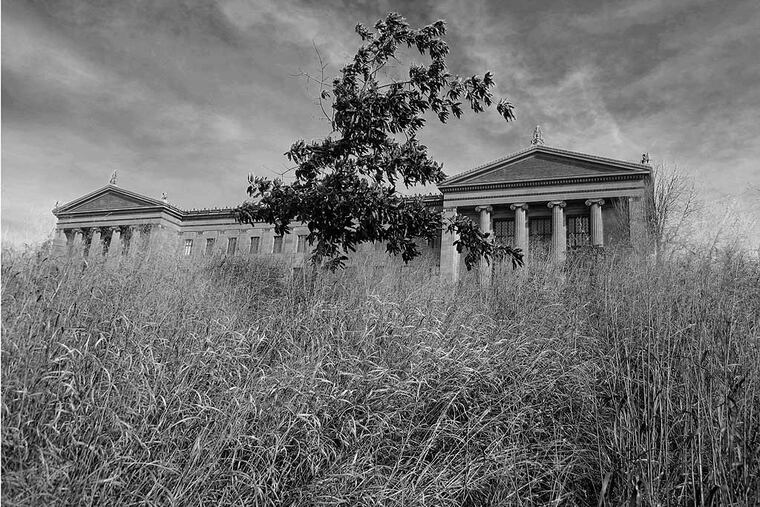Art on the hill and crowds in the streets
By Beth Kephart I had been too long gone. On this day (a miracle) I was home. Tomorrow the winds would howl, but today was sky-blue calm. Tomorrow the world would rush and I would worry. Not now.

By Beth Kephart
I had been too long gone. On this day (a miracle) I was home. Tomorrow the winds would howl, but today was sky-blue calm. Tomorrow the world would rush and I would worry. Not now.
Right now was the man I love, beside me. It was the goofy-foots and grinds at Paine's Park. It was the river otter out for a swim in the Schuylkill. It was the Spring Garden Bridge wrapped like a Christo sculpture and the tall fringe of November weeds along the Banks and the miles of no cars and the tens of thousands of runners - marathoners, half-marathoners - who had come from all around the world to run forward into history.
Some of the runners had already crossed the finish line and were among the walkers now, wearing their silver Super People capes and medals. Some were holding their own signs as they moved past the mounted policeman and the Perelman Building and toward the Parkway finish, where an emcee with a broadcast mike was calling out the names of the winners. Winner. Winner. Winner. Everyone a winner. So many winners that even those who had not run triumphed according to proximity.
You could hear the ricochet of names up along the stone wall of Girard College. You could hear it on Ringgold Street and down by Eastern State Penitentiary and inside the London Grill on Fairmount Avenue, where the ghost of Willie Sutton is said to live and where they were tuning their TVs in preparation for the Eagles' tromping of the Titans. You could hear it in the shadows of the Fairmount Park gazebo and by the Franz West Lips in the Anne d'Harnoncourt Memorial Sculpture Garden, but you could not hear it inside the dolomite vault of the Philadelphia Museum of Art.
It was nearly silent there.
It was almost still.
The day had only newly begun in the Dorrance Galleries, where the master work of photographer Paul Strand hung. Gray tones and birch trees and a stolen yawn. A mother in a doorway with her sons. The scroll of the fern, a child's stare, the famous long shadows of Wall Street. Glass plates, cameras, travel logs. The first wife. The last one.
We had slipped inside, my husband and I. Left the boomerang of the marathon, and we were walking, room by room, turning the corners, stopping to see. We were holding hands, or standing far apart, while outside the runners ran, and their fans cheered, and up and down the Parkway and in the redbrick alleys and maybe even as far as Manayunk, the names of the winners ricocheted, one by one.
I studied the deep sepia smears of the frozen moments. I stared into the eyes of portrait subjects who would never again be so young. I wondered about the girl who carried the books on her head, and had she read them, and how had Strand convinced her to stand against that wall and cast her eyes so unself-consciously down, and what had she become?
I thought of all the times that this museum had left me steeped in some version of awe. How it had hushed me when my child was young and taught me as I learned to teach. (What is color? What is landscape? What is story? I learned some of that here.) I imagined the memoir I might write around the paintings, the teahouse, the armor, the hats, the borrowed collections, and the permanent ones that infiltrate a life and a way of thinking. I thought of how this museum sits high on a hill and how it had once been (the metaphor so rich) the city's reservoir.
Outside, in the streets, the winners ran, the crowds surged, the silver Super People capes caught the sun. Here, in the Dorrance Galleries, the photos of people and places now mostly gone quietly hung. A city is ghosts and stones. It is snap and still. It is art on the hill and a man and his wife and a victory crowd. A city is dualities, endlessly refracted and repeated, complexities unwound, winning by proximity.
I was home. I was here.